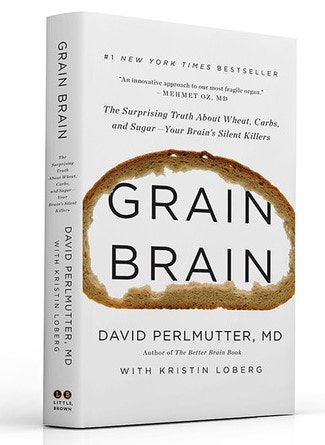Let’s talk a little about health – particularly, how physical wellness directly impacts mental health. I recently finished a book by Dr. David Perlmutter, called “Grain Brain” (2018, updated from the original edition published in 2013). Perlmutter reveals that eight out of 10 Americans fear a brain-debilitating disease such as Alzheimer’s or dementia more than death. And if type 1 and type 2 diabetes were not enough worry about, some docs have proposed to give Alzheimer’s the “type 3 diabetes” name.
The link between Alzheimer’s and a high-carb, low-fat diet seems a little clearer. Diabetes itself doubles the risk for developing Alzheimer’s, and we can clearly show that what you eat can over time lead to type 2 diabetes. You are what you eat, and that extends to your brain. Avoiding undue inflammation in the gut over time may help you avoid long-term complications.
 Find more about Perlmutter’s Grain Brain book via this link.
Find more about Perlmutter’s Grain Brain book via this link.A principal culprit to inflammation from food is gluten – a term that comes from the Latin for glue — a protein that acts like an adhesive holding flour together to make bread, crackers, pasta, baked goods, pizza and more, as Perlmutter points out. The majority of Americans ingest gluten through wheat or wheat-based products. However, gluten can be found in a variety of grains such as barley, rye, spelt, bulgur and kamut. Gluten is a common additive in processed foods, but also in hygiene products like conditioners, shampoos, body wash and cosmetics. Most people associate gluten with celiac disease, but that’s an extreme form of gluten sensitivity; all of us have some level of gluten sensitivity.

Eliminating gluten-containing foods from your diet, while not exactly practical for everyone, might lessen, reverse or even put into remission many chronic health conditions, Perlmutter contends – anything from simple anxiety or various mood disorders to arthritis and peripheral neuropathy.
When I wrote my “Health case for hours of service change” last year, I spoke with Dr. John McElligott of Express Medical Solutions about the fast food diet too many of us eat, and he recommended a low-carb “Mediterranean diet,” heavy on vegetables, nuts, legumes and moderate levels of protein from sources like seafood. Such a diet has been shown in some instance to significantly decreases the risk for Alzheimer’s and can protect the brain from developing dementia, if combined with physical activity and plenty restorative sleep.
There are good dietary lifestyle changes drivers can make to improve their health and reduce risk for developing or reversing the above-mentioned health issues. This can be done by going with diets such as paleo and Mediterranean, or nutrient dense keto (NDK), a mixture of keto and paleo but as organic as possible. To learn more about NDK listen to Kevin Rutherford on Sirius XM radio channel 146.
Here’s what I’ve been doing: Whatever the diet, every time you put something in your mouth, ask yourself the following question. Is this meat, egg, vegetable, fish, or nuts and seeds? If not, I don’t eat it. I have been eating this way for a year now, and my food expenditure on the road has gone from $250 a week to about $75 a week, so it can be done on the road.
In my last post, I wrote of the walls some drivers face in seeking mental health treatment on the road – and it’s not just mental health, but physical health as well. So when making these changes, consult your doctor and, hopefully, they will be on board. Keep in mind, though, that many doctors may have little to no nutritional training.
Still, there are resources drivers can access:
- The Institute for Functional Medicine can help you find an MD trained in nutrition,
- Dr. John’s McElligott Express Medical Solutions who has worked with drivers for years.
- A new resource I was introduced to after my past post is Everywhere.care, where drivers can have access to doctors and mental health professionals for $10 a month using this code: LOAD10.
The main thing to remember: the length of your career and quality of your life greatly depends upon what you eat.










